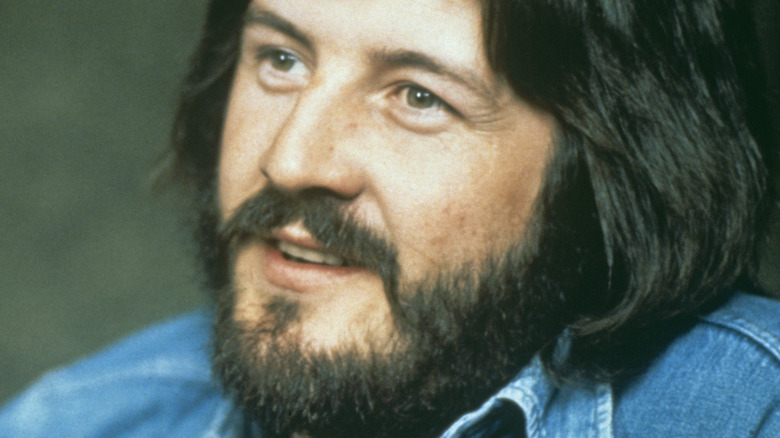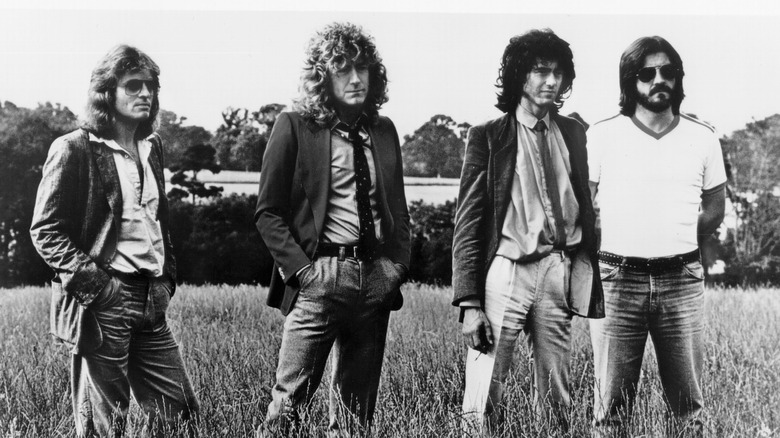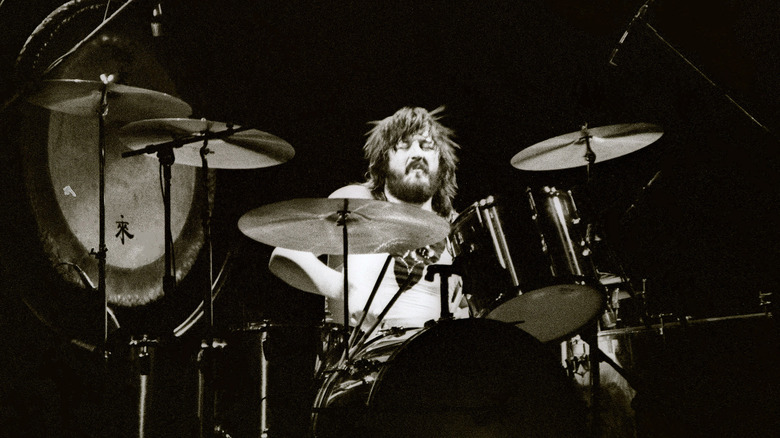Why John Bonham Hated Led Zeppelin's Reggae Song
Few bands have achieved the success that Led Zeppelin has. A simple scan of Led Zeppelin's back catalog reveals a band that was not afraid to continuously change their sound to explore new musical terrain. Led Zeppelin, not content to be constrained to the vocabulary of power blues or folk rock, continuously tiptoed over restrictive genre borders to create something entirely fresh and thrilling. Whether it was the Indian-influenced "Kashmir," or the Celtic revival influence throughout their albums, Led Zeppelin was not afraid to experiment with worldly genres.
That being said, it was likely inevitable that members of the group would have to compromise and play songs they didn't particularly enjoy in the attempt to chart new musical territory. When it came to their adored drummer and hedonistic hellraiser, John Bonham, he frequently expressed resistance to anything that he perceived would dilute his distinctive thunderous sound.
"Black Dog" is an excellent example of a Led Zeppelin song with John Bonham performing exactly what he felt like, with fantastic results. The band had hoped for cascading, intricate time signature changes to the rhythm, but Bonham, a drummer who depended on instinct rather than counting beats, just played a basic, thumping "four to the floor" pattern that made the song connect (via Ultimate Classic Rock).
There's one song in Led Zeppelin's back catalog, however, that half the band despised: ”D'Yer Mak'er”.
Did You Make Him?
"D'Yer Mak'er," from the 1973 album "Houses of the Holy" is an unusual foray into reggae. The song's title originates from a joke that "D'Yer Mak'er," i.e. "did you make her?" sounds like Jamaica in a Cockney accent. When it came to the band's judgment on the song, it seems that the jury was deadlocked. Robert Plant and Jimmy Page seemed to favor it, pushing for a single release, whilst John Paul Jones and John Bonham seemed to resent it.
John Paul Jones stated that Bonham "hated playing reggae — he felt it was really boring." Jones went on to elaborate that Bonham "wouldn't play anything but the same shuffle beat all the way through," conceding that "it would have been all right if he had worked at the part, but he wouldn't, so it sounded dreadful" (per "Led Zeppelin: The Story of a Band and Their Music” by Keith Shadwick).
Despite the laid-back nature of reggae music, the interlocking of the bass and drums has to be pretty precise. In the song, Bonham plays a lackluster imitation of the rock-steady beat. Although, it's not as though Bonham, one of the world's top drummers at the time, couldn't perform "D'Yer Mak'er." He could, after all, play the drums with four sticks. So, why does "D'Yer Mak'er" fall flat?
While it's a stretch to call it self-sabotage, it appears that Bonham's heart wasn't in it and he refused to budge when it came to recording "D'Yer Mak'er," which may have contributed to the fact that Led Zeppelin never performed the song live (per ''Led Zeppelin: A Celebration'' by Dave Lewis).
In ''D'Yer Mak'er''s Defense
Although Led Zeppelin never officially released singles in their native U.K., 'D'Yer Mak'er managed to peak at No. 20 on the U.S. singles chart (via AllMusic). Despite this, Rolling Stone scathingly called the track ”a pathetic stab at reggae that would probably get the Zep laughed off the island if they bothered playing it in Jamaica.” Other British bands, such as The Police and The Specials, may have had a more refined approach to incorporating reggae into rock with their ska-influenced sound.
Certain contextual considerations, however, must be taken when judging the track. If the song is indicative of Led Zeppelin's tongue-in-cheek humor, it appears that some critics missed the joke. While Rolling Stone deemed "D'Yer Maker" and its sibling track "The Clunge" to be "arguably the worst things the bands have ever attempted," the claims of appropriation are a tad harsh.
After all, reggae music was still relatively underground in the U.K. and the U.S., and integral artists like Bob Marley hadn't yet become household names. Although reggae was a fundamental part of Caribbean communities in the U.K. finding their cultural voice, it wasn't yet being played by white disc jockeys on the radio (via N.P.R.).
The world's gaze was firmly fixated on Led Zeppelin. By presenting a song with a playful reggae twist to the mainstream rock audience, Led Zeppelin was effectively bringing reggae to a broader audience, thereby doing it a service.


